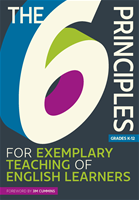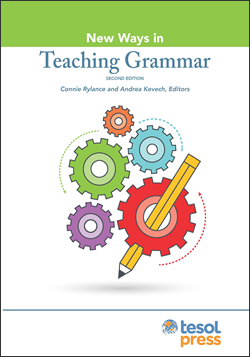Resource Roundup: Working on New Year's Resolutions With Your ELs
by Tomiko Breland
 The New Year is just around the corner! Come January 1, educators are often focused on ways to improve their craft by engaging in more professional development, reading more books, and trying new apps. Though these are all worthy endeavors and admirable efforts, it's critical that we also enable our English learners to communicate with us and with one another about how they would like to improve themselves during the upcoming year.
The New Year is just around the corner! Come January 1, educators are often focused on ways to improve their craft by engaging in more professional development, reading more books, and trying new apps. Though these are all worthy endeavors and admirable efforts, it's critical that we also enable our English learners to communicate with us and with one another about how they would like to improve themselves during the upcoming year.
Here are some ideas culled from the web to help you give your students the tools to make their own New Year’s resolutions for 2019.
1. New Year’s Activities for Beginner and Intermediate Learners
This page offers free images to scaffold a New Year’s resolution–writing activity with your beginner learners and to practice the future tense. It also includes a New Year’s reading activity for low beginners.
2. New Year’s Resolutions Lesson Plan
This complete 1-hour lesson plan from the BBC TeachingEnglish website is for ages 11–18, Levels B1/B2, and is for teaching your English learners New Year traditions and resolutions. It includes detailed steps and a student worksheet.
3. New Year’s Resolutions: A Conversation Lesson for Adults
This article by Ricardo Barros includes group discussion, pair work, reading comprehension, and a video activity; it also provides some excellent follow-up options to examine language structure and vocabulary in the lesson.
4. Activity: New Year’s Resolutions
This quick new year’s resolution activity, from TESOL Training Madrid (@TtMadridTEFL) on Twitter, uses flash cards and gets your students communicating with each other.
5. Conversation Questions: New Year’s Resolutions
This is a basic list of questions from the Internet TESL Journal to get conversations started among your students.
6. A New Year’s Lesson Your Learners Will Remember Throughout the Year
This article by Claudia Pesce on BusyTeacher.org provides some great ideas for New Year’s activities at many levels. She shares links to worksheets, ideas for young learners’ crafts, suggestions for exploring international New Year celebrations, and a list of New Year–related readings.
Tomiko Breland is TESOL project editor. She received her BA in English from Stanford University, her MA in writing from the Johns Hopkins University, and her certificate in TESOL from Anaheim University. In her free time, she writes and edits fiction.
TESOL Blogs
Interested in writing a blog for TESOL?
Read the submission guidelines and send us your post!
Check out some of the most recent TESOL Blogs:
|
The Unapologetic Advocate: Why We Advocate, by David Cutler
 This blog has been a long time coming. Truth be told, I put this off for a long time; not because I had no idea what I wanted to say, but because I didn’t know how to say it. I decided on the version that reflects me the most: the brutally honest, oftentimes sarcastic, unapologetic one. I’m well aware that my style might be different than what is normally posted in this space, but I also think we shouldn’t be afraid to be honest about how we feel, what we’re thinking, and who we are, especially when it comes to advocating for the things we care about. So, if you came here expecting a black and white picture on advocacy, I’m not sorry; advocacy and policy work is as gray a picture as you can get. Read more. This blog has been a long time coming. Truth be told, I put this off for a long time; not because I had no idea what I wanted to say, but because I didn’t know how to say it. I decided on the version that reflects me the most: the brutally honest, oftentimes sarcastic, unapologetic one. I’m well aware that my style might be different than what is normally posted in this space, but I also think we shouldn’t be afraid to be honest about how we feel, what we’re thinking, and who we are, especially when it comes to advocating for the things we care about. So, if you came here expecting a black and white picture on advocacy, I’m not sorry; advocacy and policy work is as gray a picture as you can get. Read more.
|
|
Video for ELT, Episode 1: TED Talks, by Greg Kessler
 There are many engaging ways to use video and video creation projects in teaching English. There are also, of course, numerous videos online that can be useful in various English teaching contexts. Video streaming sites such as Vimeo and YouTube provide access to a seemingly endless supply of video content, but this can quickly result in the sensation of being overwhelmed and leave teachers uncertain of where to begin. Read more. There are many engaging ways to use video and video creation projects in teaching English. There are also, of course, numerous videos online that can be useful in various English teaching contexts. Video streaming sites such as Vimeo and YouTube provide access to a seemingly endless supply of video content, but this can quickly result in the sensation of being overwhelmed and leave teachers uncertain of where to begin. Read more.
|
|
Language Acquisition vs. Language Learning in Elementary School, by Judie Haynes
 One of the questions I am most frequently asked is how I teach grammar rules to young English learners (ELs). Well, the truth is that I never taught out-of-context grammar to young students. I learned early in my career that research shows that grammar drills do not work with students of any age. According to Krashen (1988), a linguist specializing in theories of language acquisition and development, there is an important distinction between language acquisition and language learning. Read more. One of the questions I am most frequently asked is how I teach grammar rules to young English learners (ELs). Well, the truth is that I never taught out-of-context grammar to young students. I learned early in my career that research shows that grammar drills do not work with students of any age. According to Krashen (1988), a linguist specializing in theories of language acquisition and development, there is an important distinction between language acquisition and language learning. Read more.
|
TESOL Bookstore

Featured Resources from TESOL Press
 The 6 Principles for Exemplary Teaching of English Learners
The 6 Principles for Exemplary Teaching of English Learners
With a Foreword by Jim Cummins
TESOL International Association Writing Team
As the number of English learners around the world soars, so does the need for quality English language instruction. TESOL International Association has furthered its ELT leadership role by defining a core set of principles for the exemplary teaching of English learners. The 6 Principles will help you make informed decisions to improve English language instruction and assessment. These foundational principles are for all educators and are applicable across different educational settings. This book features a detailed explanation of The 6 Principles, practical applications for your classroom, ideas for building a strong community of practice, and more!
 New Ways in Teaching Grammar, Second Edition
New Ways in Teaching Grammar, Second Edition
Connie Rylance and Andrea Kevech
Unsure of how to include creativity and project-based learning in grammar lessons? The 2nd edition of this best-selling book includes updated activities and new contributions that cover a wide range of teaching techniques -- from introducing a specific grammar point to providing meaningful, contextualized practice.
 More Than A Native Speaker: An Introduction to Teaching English Abroad, Third Edition
More Than A Native Speaker: An Introduction to Teaching English Abroad, Third Edition
Don Snow and Maxi-Ann Campbell
In this newly updated third edition, learn step-by-step how to effectively teach English abroad. Gain valuable tips and resources for teaching in an unfamiliar educational system, working with students of varying ages and skill levels, and adapting to life in a different culture. A rich array of online resources and activities included.